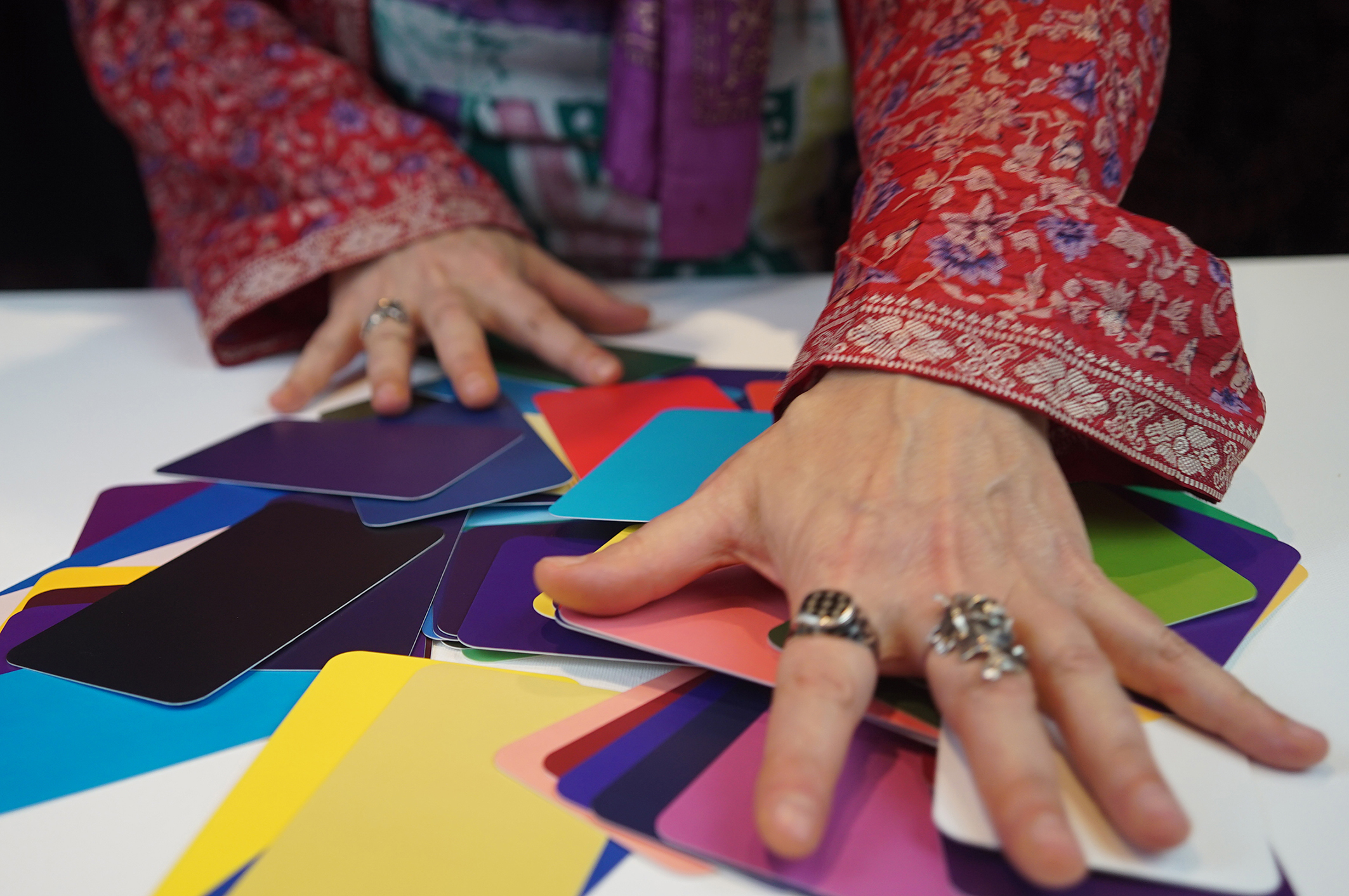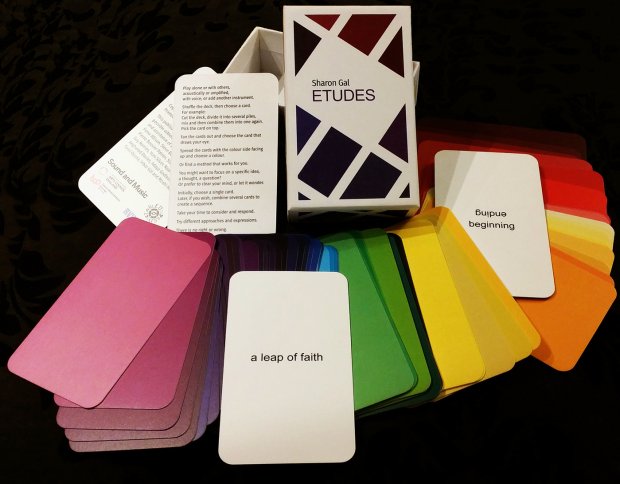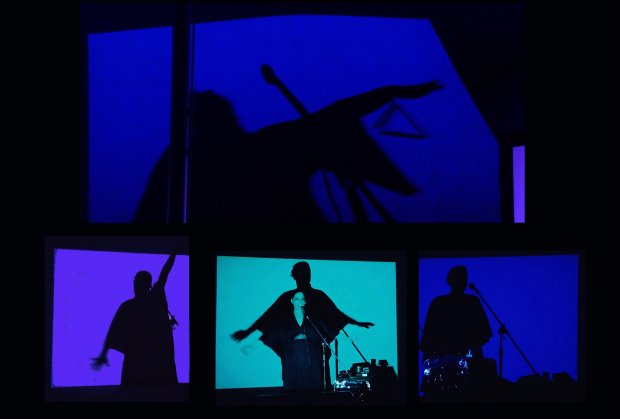
Having submitted her work, Etudes, to our physical collection, composer Sharon Gal spoke to Sound and Music's Heather Blair about the work's conception, and her hopes and intentions for its future.
Having submitted her New Voices supported work, Etudes, to the British Music Collection's physical collection, composer Sharon Gal spoke to Sound and Music's Heather Blair about how the work was conceived, and her hopes and intentions for its future.
Can you begin by talking us through your compositional practice, your inspirations and influences?
My practice includes performance, recordings, audio-visual and participatory large-group compositions. I work both solo and in collaboration.
In free improvisation the compositional process is part of a ‘live’ experience in which everything is fused in the moment and moving in time. Before a performance I consider the space, the acoustics, what instruments and material to include in my palette. Then, I free myself from all intentions and concerns, quiet the mind, tune in, listen, and let sound resonate and move me. Free improvisation embraces impermanency and presence. It is direct and immediate, highlighting the moment and the process of becoming. For me, it is an approach, a methodology - not a style. It is an open form, influenced by the players’ experience, life energy and imagination. It is particularly engaging, challenging and satisfying, when done in collaboration with others and entailing no outline or conversation about the music, a collective composition in real time - a kind of sorcery.
Improvisation also sets the foundation for my recordings and audio-visual work. There is usually an idea of the domain I wish to explore, and the process involves recording many tracks, keeping some and mixing in additional material, field recordings and electronics. It is a playful process, a form of assemblage bringing together different elements through chance, juxtapositions and unexpected ‘accidents’.
© Online performance MAKE IT UP CLUB 30.11.2021
For over a decade I have been exploring Open Scores, directing participatory large-group compositions, inviting musicians & non-musicians to experiment, play together and perform. This is a growing body of work with pieces for electric guitars, micro amps, voices, toys, balloons, breath and movement. L’esprit d’escalier takes place in a staircase; its resonance draws out hidden frequencies and voices. Long Drone is for anyone who can play a single note on any instrument.
These pieces are durational and site-specific, with attention and focus on the acoustics, the interplay with the space and the shifting dynamics within the group. Performed without a written score, the composition takes shape as players respond to prompts, suggestions and simple instructions. I had always participated in the ensembles, and compositions were developed and performed in a day. Living with the pandemic for nearly two years now, these performances seem a lifetime away; with large numbers of players and audience, interacting in person, without distancing or masks.
In lockdown and isolation I wondered how to keep this work relevant and alive. How best to communicate the thoughts and principles which guide and inspire its creation, how to present it without my physical presence, how to engage and reach out across time and space? This led to the creation of Etudes, a deck of 78 cards of texts and colour scores: to play and actuate, alone or with others. It is open, modular and tactile - a catalyst to set off the mind. Players can focus on one card or create their own sequenced ‘notation’, combining several texts and colours.
I find inspiration through collaboration. It is a deep, surprising and illuminating connection that sparks my spirit and imagination. It gives rise to new possibilities, ways of sounding, states of being. At times I shut off from external influences. I sit in the garden, take a long bath, a cold shower, vocalise. I love walking. It is a meditation through movement, relaxing, energising and holistic, an action for mind and body. I find my pace, place, time and space.
© ETUDES by Sharon Gal
Can you tell us a little bit more about Etudes? Who was involved? And what responses have you received from performers and audiences since you published it earlier this year?
Etudes is a leap of faith and an invitation, waiting to come alive, to come out of its box and play. The deck was published earlier this year alongside a series of online presentations and talks. Unfortunately, due to Covid I was, and still am, unable to offer in-person workshops as I originally envisioned. The work turned out beautifully and I am happy and grateful. It is now charting its own course and I am curious about its future and place in the world. It was supported by Sound and Music’s New Voices programme and Unpredictable Series CIC. I am particularly thankful for the care, advice and assistance of Fiona Allison and Blanca Regina who accompanied me patiently and generously throughout this journey.
Since its publication people have been documenting and sharing their experience of process and outcome. Each engagement is unique and original. It is a joy to see/hear such a wide range of responses and approaches, all so different from my own - Wonderful.
You can see some here and here.
As an artist on the New Voices programme, you are one of the few currently eligible to donate new items into the British Music Collection physical archive. Were there any specific motivations or circumstances behind you wanting to include Etudes to an archive or collection?
While I exhibit and release music and videos, a large part of my practice remains focused on live performance and the ephemeral. Nowadays it is difficult to avoid any form of documentation, but I like to think that the main archival mechanism of these live pieces is the memory of the players and the audience.
Etudes is a score, a work to return to time after time. I’m delighted and honoured it now resides with the British Music Collection. It sets the work within a contemporary narrative and a living archive. Entering the public domain will extend its potential to reach new players and audiences and create further opportunities.
The majority of the collection dates from 1960 onwards but there are a few items stretching back as far as 1900, including over 60,000 scores. Is there anything missing, or that you would like to see more of?
I would love to see work by the Scratch Orchestra included in the collection. 2022 is the 50th anniversary of the Scratch Music book publication. It is out of print and copies of the original are expensive and rare. Scratch Music includes scores by twenty orchestra members and is edited by Cornelius Cardew. There are 737 scratch compositions, graphic scores and text instructions, and 1001 activities presented as text instructions. This is a workbook to play and engage with, a fascinating testimony documenting an important period of British musical history, and a valuable ‘hands on’ practice manual that should be made available to delight and inform a new generation of practitioners, readers and audience. I was involved in an attempt to republish the book, but unfortunately it fell through, so this is close to my heart and feels urgent and necessary.
© Sharon Gal SOLO
What are your hopes and intentions for people discovering Etudes in the collection in say, 100 or 200 years? How would you like them to respond?
It is difficult to imagine 100 or 200 years ahead, particularly facing environmental calamity, major disruption – if not annihilation – of our civilisation, way of life and what we take for granted. If the work survives that long and there are people to play it in the future, this will be fantastic. Perhaps it will be played by AI? Otherwise, I do not have expectations for the work. Rather, some questions: What could it be/become? What is its meaning and place in the world? The Tarot, which inspired some aspects of the deck’s development & form, have been practiced and played for 500 years. Etudes is now independent and part of the world, for posterity. It has its own destiny.
One thing we are mindful of is that the British Music Collection physical archive tends to privilege a picture of British music history that is predominantly white, as well as male, heterosexual and elite. Going forward, what changes would like to see take place within archives and collections to help ensure that voices previously erased from the conversation are now platformed and their narratives pushed forward?
Archives and collections reflect the status quo of a particular culture in a specific time. I believe things are a changing and attitudes are shifting. The fact that you are asking me this question points to a concern and dissatisfaction with past attitudes. From what I’ve noticed, there is an attempt to review and revise the British Music Collection by inviting different ‘curators’ to examine and reflect on the collection. These fresh eyes and ears offer new perspectives, which raise questions about material and work that is missing. As the revision of the past is ongoing, narratives and hierarchies are re-examined and challenged, more research will reveal currently hidden, suppressed and overlooked work. It will surface.
I hope the archive will accept these works into the collection, thus presenting an updated and more in-depth understanding of historical narratives, with a broader view to mapping the changing topography of the British music terrain.
You can now explore a digital version of ETUDES via the British Music Collection online catalogue.
With thanks to Dr Rebecca Bowd at Heritage Quay, University of Huddersfield.
Find out more about Sharon Gal at the links below:
britishmusiccollection.org.uk/composer/sharon-gal
Shop for Etudes here: https://sharongal.bigcartel.com/product/etudes
Cover image:
© ETUDES by Sharon Gal / Photo © Blanca Regina

